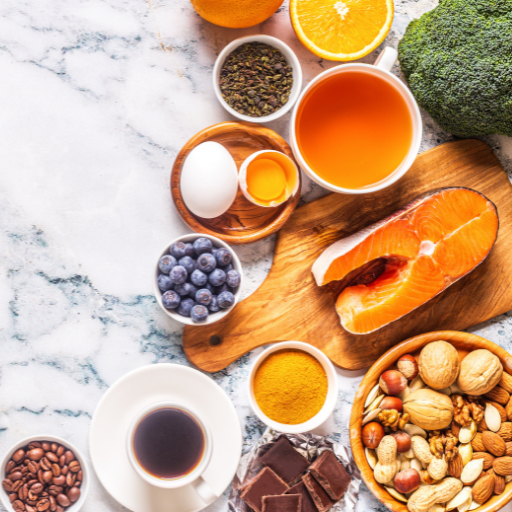Did you know that eating food for memory is one of many ways to improve cognitive functions and prevent neurodegenerative diseases? Sure, Sudoku, brain games and reading can help… but improving memory through a yummy whole food diet sounds pretty good to us. Here are some ways you can keep your memory sharp with simple everyday habits and diet choices.
Improving your memory
Before we dive into diet hacks to get your brain firing, here's a few simple lifestyle habits that can help keep your memory sharp.
Exercise
Upping your physical activity can increase the blood flow in your brain, making remembering easier (13).
Brain games
Research suggests that engaging in mentally stimulating activities, like puzzles, or games can protect the brain by strengthening memory. Learning a musical instrument also helps keep you mentally active (13).
Stay social
Socialising with others helps with managing stress, which may negatively affect cognition and memory (13).
Get quality shut-eye
Sleeping well is also important in making sure your brain is able to consolidate memories and learnings from the day (13).
Eat a balanced and varied diet
Diet plays an important role in keeping your short term and long term memory sharp. Different foods contain varying nutrients. Some of these nutrients directly impact the workings of our brain. Consuming a wide variety of different foods will ensure you're getting all the nutrients you need and reduce the risk of developing memory related issues.
Food for memory
Here is a list of different types of food that can help enhance memory:
Beef
Beef contains zinc and iron, both of which support brain function and your immune system (3, 4). While beneficial, remember to consume red meat in moderation because an excessively high-intake of red and processed meats puts people at higher risk for a number of diseases (5).
Fish
Fatty fish (and fish oil) are abundant in Omega-3 fatty acids, healthy unsaturated fats, and plenty of other nutrients like astaxanthin. They are proven to lower blood levels of beta-amyloid—the protein that forms harmful clumps in the brain of those afflicted with memory disorders (6).
Fatty acids are major components of the brain that are vital for brain development and overall function. Some studies also reveal that Omega-3 is effective in improving docosahexaenoic (DHA) and eicosapentaenoic acid (EPA) levels. These both play important roles in brain health maintenance (7).
Fruits and nuts
Citrus fruits and berries are powerful antioxidants high in vitamin C (8), which is an important antioxidant. Neurodegenerative disorders are related to oxidative stress. Vitamin C can potentially support you against mental degradation (9).
Berries, in particular, also contain flavonoids, which are proven to improve memory (6).
One study also shows that the Mediterranean Diet may help prevent memory disorders (10). This great diet is sometimes called ‘food for memory' involves eating lots of fruits, vegetables, nuts, olive oil, and seeds as these contain plenty of L-carnitine (including Acetyl L-carnitine), proteins, and healthy fats (6).
Leafy green vegetables
Kale, spinach, broccoli, and other leafy greens contain vitamin K, beta carotene (6), vitamin B Complex (11), magnesium (12), lutein, folate, and a bunch of other vitamins and minerals. All of these are essential food for memory as they help reduce cognitive decline.
You can incorporate more of these types of food into your diet to improve memory. However, as seen in many cases, what you eat for your meals may not be enough to reach your daily required intake. Vitamins and supplements can be consumed alongside a well-rounded diet to help achieve your daily nutrient targets.
Be confident that you are meeting your daily intake of vitamins and minerals with custom supplements from Vitable. We'll give you the option to put together a mix of these supplements to create a personalised vitamin subscription pack. We'll even take care of the vitamin delivery so that these are delivered straight to your doorstep anywhere in Australia.
Learn more about the other health benefits of these supplements here:
Zinc | Iron | Astaxanthin | Ashwagandha | Magnesium | B complex | Acetyl L-carnitine | Vitamin C | Vitamin B12 | Ginkgo Brahmi | Fish Oil
*Always read the label. Follow the directions for use. If symptoms persist, talk to your health professional. Vitamin and/or mineral supplements should not replace a balanced diet.
References:
- World Health Organization. “Dementia.” Published on 2 September 2021 on https://www.who.int/news-room/fact-sheets/detail/dementia Accessed on 26 September 2021.
- Fernando Gomez-Pinilla. “Brain foods: the effects of nutrients on brain function.” Published on 12 January 2010 on https://www.ncbi.nlm.nih.gov/pmc/articles/PMC2805706/. Accessed on 26 September 2021.
- Health Direct. “Foods high in zinc.” Published on n.d. on https://www.healthdirect.gov.au/foods-high-in-zinc. Accessed on 26 September 2021.
- Health Direct. “Foods high in iron.” Published on n.d. on https://www.healthdirect.gov.au/foods-high-in-iron. Accessed on 26 September 2021.
- Harvard Health Publishing. “What's the beef with red meat?” Published on 1 February 2020 on https://www.health.harvard.edu/staying-healthy/whats-the-beef-with-red-meat. Accessed on 26 September 2021.
- Harvard Health Publishing. “Foods linked to better brainpower.” Published on 6 March 2021 on https://www.health.harvard.edu/healthbeat/foods-linked-to-better-brainpower Accessed on 26 September 2021.
- Emma Derbyshire. “Brain Health across the Lifespan: A Systematic Review on the Role of Omega-3 Fatty Acid Supplements.” Published on 15 August 2018 on https://www.ncbi.nlm.nih.gov/pmc/articles/PMC6116096/ Accessed on 26 September 2021.
- Health Direct. “Vitamin C.” Published on n.d. on https://www.healthdirect.gov.au/vitamin-c Accessed on 26 September 2021.
- Harrison, F, et.al. “Vitamin C Function in the Brain: Vital Role of the Ascorbate Transporter (SVCT2).” Published on 6 January 2009 on https://www.ncbi.nlm.nih.gov/pmc/articles/PMC2649700/ Accessed on 26 September 2021.
- Kepka, A., et.al. “Preventive Role of L-Carnitine and Balanced Diet in Alzheimer's Disase.” Published on 3 July 2020 on https://www.mdpi.com/2072-6643/12/7/1987/htm. Accessed on 26 September 2021.
- Health Direct. “Vitamin B.” Published on n.d. on https://www.healthdirect.gov.au/vitamin-b Accessed on 26 September 2021.
- Health Direct. “Foods High in Magnesium.” Published on n.d. on https://www.healthdirect.gov.au/foods-high-in-magnesium. Accessed on 26 September 2021.
- Mayo Clinic Staff. "Memory loss: 7 tips to improve your memory". Mayo Clinic. Published March 2021 on https://www.mayoclinic.org/healthy-lifestyle/healthy-aging/in-depth/memory-loss/art-20046518. Accessed 3 October 2021.







